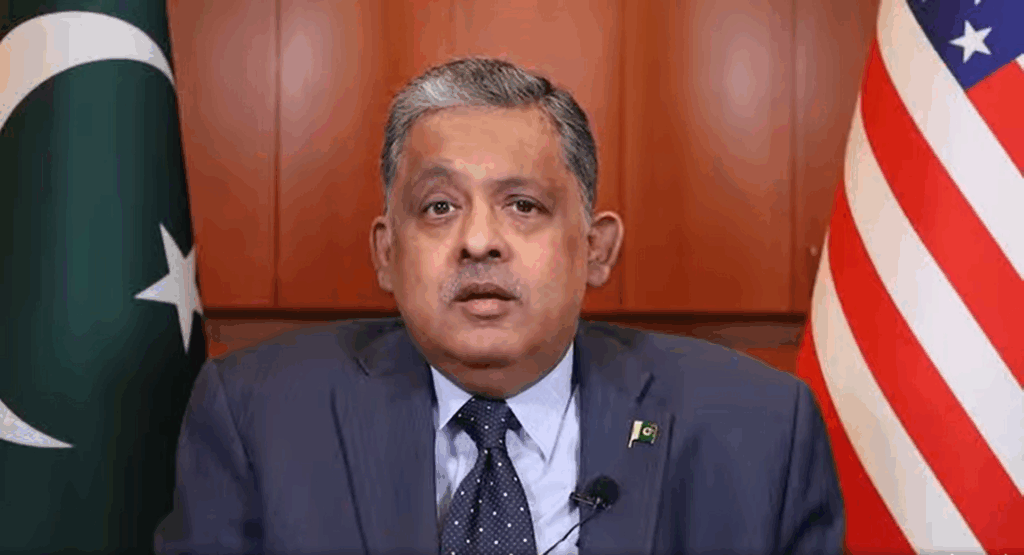- Web Desk
- Feb 19, 2026
Pakistani ambassador urges Trump intervene to ease tensions post-Pahalgam
-

- Web Desk
- May 01, 2025

NEW YORK: In a recent exclusive interview with Newsweek, the Pakistani Ambassador to the United States (US), Rizwan Saeed Sheikh, urged the US President Donald Trump to take action to alleviate the escalating tensions between Pakistan and India following the Pahalgam attack in Indian-occupied Kashmir on April 22.
The Pakistani ambassador highlighted the gravity of the situation, detailing the nuclear capabilities of both, India and Pakistan, as well as China, which also has interests in the region.
Read more: India planning military action in 24–36 hours: information minister
The Pahalgam attack strained the already fragile relations between the two arch-rivals, as both sides downgraded diplomatic ties while India suspended the Indus Water Treaty, an agreement that ensured the water-sharing of rivers between the two densely populated nations.
Clashes also erupted along the Line of Control, with both India and Pakistan accusing each other of planning imminent military strikes.
The Pakistani ambassador stated that the Trump administration should adopt a more comprehensive and sustained approach to the Kashmir dispute, rather than merely focusing on immediate de-escalation measures. “We are not talking about one or two countries in that neighbourhood, who are nuclear capable. [T]his is how graver it is”, he informed the Newsweek correspondent.
Rizwan Saeed called for an urgent need to intervene to prevent further escalation of hostilities.
While Trump did condemn the Pahalgam attack, he maintained a neutral stance regarding the India-Pakistan dispute over Kashmir. In a rather Trump-ian fashion, the reality media mogul claimed the Kashmir dispute was over a thousand years old!
Kashmir has long been a contentious topic between the two South Asian nations, going back to the very creation in 1947. The two engaged in several wars since 1948 over the territory, with a limited war occurring in 1999 – Kargil war.
As recent as 2019, the situation exacerbated by the hardliner, Hindu-nationalist government of Narendra Modi revoking the special status of Indian-occupied Kashmir. The action was met with extreme anger and an uptick in violence in the once-peaceful valley.
In the aftermath of the Pahalgam attack, several foreign actors, including Chinese, Middle Eastern and the US officials called for cooler heads to prevail, and urged a diplomatic, peaceful end to the latest escalation in tensions.
The United Nations Secretary-General Antonio Guterres called for a diplomatic dialogue, with the Pakistani Prime Minister Shehbaz Sharif informing the UN SG of its right to defend its “territorial integrity” in case of Indian attack.
Information Minister Atta Tarar revealed that Pakistan faces very real threat of military action by the Indian army, within the next “36 to 48 hours” on Wednesday.
While India has been acting extremely belligerent, Pakistan has called for an independent inquiry into the attack, while arguing against that lack of evidence on Indian side despite vociferous accusations.
While the US has remained neutral, in a telephonic call to Pakistan, the US State Secretary Marco Rubio called on Pakistan to “condemn” the attack and “cooperate in an investigation into the attack”. He did, however, call on India to de-escalate, as well.
The US has maintained a neutral stance so far, as have almost all international actors, including China, Pakistan’s closest ally.
The Pakistani ambassador in his interview with the Newsweek also rejected any allegations of Pakistan’s involvement, arguing that such actions would be counterproductive to Pakistan’s national security; especially with the South Asian nation attempting to fix its inflation-weary economic amidst IMF bailouts.
Rizwan Saeed detailed a big shift in Pakistan’s foreign policy, moving from a focus on geopolitics to a more geo-economic approach. He said that a peaceful neighbourhood was necessary to achive economic growth and stability. “We do not want to fight, particularly with a bigger country”, he stated honestly.
Read more: Rubio asks Pakistan to condemn Pahalgam attack, cooperate
The ambassador also raised the possibility of a “false flag operation” concerning the Pahalgam attack, suggesting that there could be motives to blame Pakistan without substantial evidence. He called for New Delhi to provide proof of any alleged links between the attack and Pakistan, while also acknowledging the need for a responsible dialogue.
The Pakistani ambassador did express hope that the US and other international actors that would play a consistent role in facilitating a resolution




